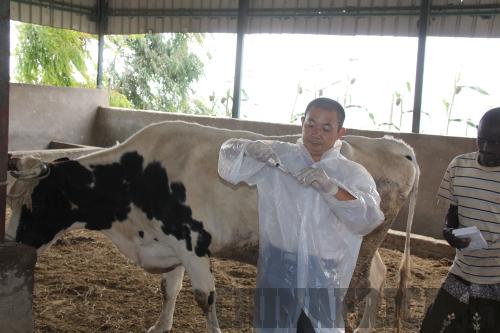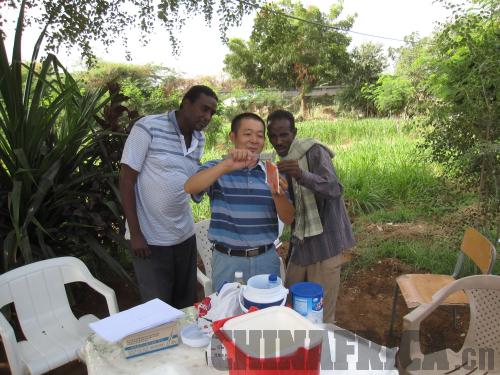| 
Vet Xiao Renrong checks on cattle health in Djibouti
For Xiao Renrong, 48, the small East African coastal country of Djibouti has become his second home. The experienced veterinarian has completed two year-long stints in Djibouti - in 2009 and 2012 - as an agricultural expert.
"I am very proud as I successfully completed two missions as the head of a Chinese agricultural expert team to Djibouti assigned by the Ministry of Agriculture of China," Xiao told ChinAfrica. "Our work was highly appreciated by [both the] Chinese and Djibouti governments."
Based on his success, Xiao, who hails from the Nanchuan District Center for Animal Disease Prevention and Control in Chongqing Municipality, will again lead a team of Chinese agricultural experts to Djibouti in the latter part of 2015, to help with the ongoing improvement of agricultural technology in that region.
Long-term planning
At the National Day Reception held by the Chinese Embassy in Djibouti in 2013, Ambassador Fu Huaqiang likened the agricultural team led by Xiao to China's medical teams that have been working in African countries for decades and have earned a solid reputation. After the reception, Djibouti officials requested a third agricultural team of experts from China, which became Xiao's third visit to the country this year.
Xiao's agricultural exchange project was a part of the Sino-African agricultural cooperation under the framework of the Forum on China-Africa Cooperation (FOCAC). At the FOCAC Beijing Summit held in 2006, the Chinese Government decided to dispatch 100 senior agricultural experts to African countries to help with their development over the following three years; in 2009 when the Fourth FOCAC Ministerial Conference was held, the Chinese Government agreed to send more agricultural experts and agricultural teams to Africa. It was against this background that Xiao was sent to Djibouti.
Animal husbandry is the largest traditional industry of Djibouti, followed by fisheries, which has great development potential. Its tropical desert climate makes it difficult to develop crop farming. Thus, the third agricultural expert team will focus on veterinary and fishery sectors. The team will consist of four people, comprising two veterinarians, an expert on fishery and a French interpreter, selected from different parts of China.
According to Xiao, the three projects have been a planned process. In the first project, the Chinese experts carried out investigations and made plans; in the second project, they began to demonstrate China's advanced agricultural technologies to their Djibouti counterparts. "The previous two projects received a warm welcome from Djibouti," said Xiao. "Without the sound outcomes of the first two projects, there would not have been a third."

Xiao Renrong training Djibouti farmers
Language preparation
Knowing that French is one of the official languages of Djibouti, Xiao spent more than 10,000 yuan ($1,612) on French lessons before his first visit.
"I was the oldest student in the class, as most of the others were university students who prepared to go and study abroad," said Xiao, who was in his 40s at that time.
French pronunciation was the biggest problem for him and he put in long hours of study, determined to succeed. After six months of hard work he could communicate in and read simple French.
"It was a hard but interesting experience, and I will never forget it," said Xiao.
In 2009, he flew to Djibouti for the first time and with his basic French and the services of an interpreter, he performed his tasks well.
On call
In Djibouti, Xiao and his colleagues conducted a series of demonstrations and held on-site trainings. They built low-temperature greenhouses and successfully grew towel gourds, radishes and black-eyed peas. In addition, during the first year, they held seven seminars with more than 100 participants, including Djibouti agricultural officials, veterinarians and agricultural experts from international organizations and local farmers.
Xiao saw to the treatment of cows and sheep, making himself available to farmers and herdsmen at all hours.
Taher Issa in downtown Djibouti is one of the farmers who regularly turned to Xiao for help.
"Xiao gave us a lot of medicines, and, more importantly, he is always there to help. That is exactly what we need," said Issa.
During his first two trips Xiao treated hundreds of cows and sheep for disease. One valuable study he conducted showed that sheep in Djibouti were seriously threatened by parasites, for which Xiao prescribed prevention and cure information. His work has provided an important basis for China to supply veterinary drugs to Djibouti for the next step of the project.
In addition, he launched a four-month experiment and training project to make yogurt for a dairy farm, using a sterilizer he brought from China. According to Xiao, the price of yogurt is almost double that of fresh milk.
"This can greatly improve local farmers' income. In addition, it can reduce local people's expenditure on yogurt. After all, yogurt made locally is much cheaper than imported yogurt," said Xiao.
Future orientation
According to Xiao, the first two year-long projects have promoted technological exchanges and cooperation in agriculture between China and Djibouti. This has paved the way for the third project beginning in 2015 to focus on more pragmatic needs in the veterinary and fishery sectors and launch more demonstrations and training programs.
Xiao and his team are ready to impart more practical knowledge to provide Djibouti farmers with a greater level of self-sustainability.
"I think we have, and will continue to implement the assistance concept of 'teaching them how to fish instead of just giving them a fish,'" said Xiao. "We can train local farmers in advanced ideologies for agricultural development and Chinese farming technologies so as to help them improve self-development capacity." |